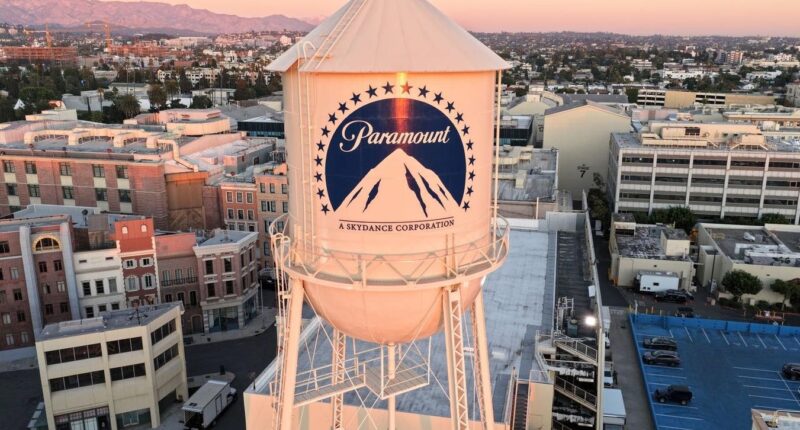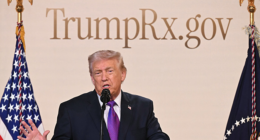Share this @internewscast.com
Paramount Global is intensifying its efforts to acquire Warner Bros. Discovery (WBD) with a strategic push, aiming to thwart WBD’s plans to sell its studio and streaming divisions to Netflix. The move would also involve spinning off WBD’s linear cable assets into a separate publicly traded entity.
Paramount has announced its intention to initiate a proxy battle by nominating its own slate of directors for the WBD board. Concurrently, it plans to file a lawsuit demanding disclosure of the analysis that led WBD to favor Netflix’s $27.75 per share bid over Paramount’s $30 per share all-cash offer. Additionally, Paramount is signaling its plan to propose an amendment to WBD’s bylaws requiring shareholder approval for any separation of the company’s linear cable assets. This aggressive approach is set against a backdrop of political influence, with recent comments from President Trump expressing doubt about the implications of a Netflix-WBD deal.
In a bold move, Paramount Chairman David Ellison has penned an open letter to WBD shareholders, announcing the company’s intention to launch a proxy contest to install new board members at WBD. This represents one of the most assertive shareholder interventions in recent media history.
Paramount Signals Proxy Contest to Reshape Warner Bros. Discovery Board
A proxy contest involves a shareholder trying to convince other investors to support an alternative slate of directors instead of those nominated by the current board. This approach seeks control not through a takeover but by securing “proxy” votes—essentially, permission from shareholders to vote on their behalf. Successfully waged, such a contest can reshape boardroom dynamics, influence corporate strategy, and potentially derail or redirect significant transactions.
Paramount’s potential proxy battle is aimed at what it perceives as a stagnant or narrowly focused WBD board. Paramount will likely argue that the current board has presided over ongoing share-price weakness, high leverage, and a strategic sales process that might not reflect the true value of the company’s assets. By installing its own nominees, Paramount hopes to expand the strategic options under consideration, including its own $30 per share offer to acquire all of WBD’s studios, streaming, and cable assets. Even securing a few board seats could give Paramount access to confidential discussions and a platform to advocate for internal changes, enhancing its chances of acquiring all or parts of WBD.
One potential outcome to monitor is WBD proceeding with the sale of its studio and streaming assets to Netflix while selling its linear cable assets directly to Paramount. This scenario could see CBS News and CNN coming under common ownership.
To that end, one potential scenario to watch for is one in which WBD proceeds with the planned sale of its studio and streaming assets to Netflix, while selling its linear cable assets directly to Paramount, an outcome that would result in journalistic standard-bearers CBS News and CNN ending up under common ownership.
Paramount Sues Warner Bros. Discovery, Seeking Transparency on Netflix Bid and Asset Valuations
Paramount Global has filed suit to force Warner Bros. Discovery to disclose how its board of directors assessed competing bids and valued the company’s studios, streaming business and cable assets.
NurPhoto via Getty Images
In addition to its proxy contest, Paramount has filed a lawsuit against WBD aimed at forcing transparency into how the WBD board of directors evaluated the competing Netflix and Paramount bids, along with its internal valuation of the assets involved.
At the center of Paramount’s complaint are three specific areas of concern:
Enterprise Value of Netflix Offer
Paramount is seeking detailed disclosures about how the WBD board valued the bid it received from Netflix. Paramount argues that WBD shareholders are entitled to understand the assumptions underpinning the Netflix offer, including projections for streaming growth, synergies, and long-term content monetization. The Paramount lawsuit questions whether alternative scenarios or competing valuations were sufficiently considered before the WBD board elected to move forward with Netflix.
Recent developments may alter Paramount’s strategy relative to its questions raised about the enterprise value of the Netflix offer. Specifically, WBD and Netflix announced today that Netflix has modified the structure of its offer for WBD’s studio and streaming assets, moving from a cash-and-stock structure to an all-cash structure. The Netflix offer remains $27.75-per-share and continues to value the studios and streaming assets being acquired at $72 billion. The all-cash structure is intended to streamline shareholder consideration of Netflix’s offer, as Netflix’s and Paramount’s competing bids can now be compared on a like-for-like basis.
Assessment of WBD Debt Burden
The second focal point of Paramount’s lawsuit challenges the manner in which WBD assessed its own substantial debt burden. With tens of billions of dollars in debt carried over from past mergers, the way those debt obligations were modeled by WBD can materially affect the perceived attractiveness of any acquisition. Paramount will likely contend that overly conservative—or overly optimistic—assumptions about refinancing costs, interest rates, and cash flow could skew the board’s judgment about what constitutes fair value. Hence Paramount’s demand for additional transparency regarding the process in which WBD evaluated the impact of its debt burden on the company’s future prospects.
Valuation of WBD Linear Cable Assets
The third focal point of the Paramount lawsuit involves WBD’s linear cable assets, which the company has indicated it may spin off or separate as part of a broader organizational restructuring. Paramount is demanding clarity on how those assets were valued, particularly at a time when traditional cable networks, while facing precipitous declines in enterprise valuation, still generate significant cash flow. The Paramount lawsuit argues that artificially undervaluing those linear cable assets could make WBD appear weaker, thereby justifying a lower enterprise valuation and acquisition price. Paramount would seek to ensure that the WBD linear cable is appropriately valued as part of its overall effort to acquire the entirety of WBD.
Paramount’s lawsuit is likely more of a strategic move as opposed to actual legal maneuvering. By seeking additional disclosures by WBD, Paramount more than likely hopes to delay the progress of (and process associated with) the proposed WBD-Netflix transaction. By simply filing its lawsuit, Paramount may succeed in getting WBD’s own shareholders to ask additional questions of the WBD board of directors related to the Netflix proposal, and, in the best-case scenario for Paramount, potentially reopen negotiations around the enterprise valuation of WBD and its assets.
Paramount Seeks Amendment to WBD Bylaws in Move to Constrain Cable Asset Spinoff
In its all-out effort to block the proposed WBD-Netflix transaction, and bolster its own prospects of acquiring WBD, Paramount signaled its intention to propose an amendment to the WBD bylaws that would require WBD shareholder approval for any separation of the company’s linear cable assets. If successful, such a bylaw amendment could complicate WBD’s intentions associated with its planned sale to Netflix.
The proposed amendment would prevent WBD’s board of directors from unilaterally spinning off or selling its linear cable networks, including CNN, TNT, TBS, Discovery Channel, without first securing a shareholder vote. Paramount will likely take the position that the WBD linear cable assets, while facing year-over-year declines in enterprise value, continue to generate substantial cash flow that supports the company’s broader operations. As a result, selling those assets without shareholder consent would reshape the overall financial profile of the company in a manner which requires the express consent of WBD’s shareholders.
The timing is significant. The WBD board of directors and its executive management have indicated that separating its linear cable business could simplify its organizational structure and make the remaining company—centered on streaming, studios, and intellectual property—more attractive to a buyer like Netflix. A streamlined WBD without cable exposure could reduce legacy risk and regulatory complexity, potentially smoothing the path for sale.
Paramount’s proposed amendment to WBD’s bylaws threatens to slow or derail that strategy. Requiring a shareholder vote introduces uncertainty, lengthens timelines, and raises the risk that a cable spinoff could be rejected or delayed. That, in turn, could affect Netflix’s willingness to proceed on existing terms or force a renegotiation of price and structure.
If adopted, the bylaw amendment would give shareholders a decisive voice over WBD’s restructuring—and inject a new layer of complexity into any potential sale.
Political Implications Loom in the Background: President Trump’s Recent Comments Indicate That the WBD-Netflix Transaction May Face Executive Level Scrutiny
President Donald Trump recently sharpened his public comments around Netflix’s proposed acquisition of WBD, expressing concerns about the deal’s competitive impact.
Getty Images
In comments made at the Kennedy Center Honors in early December 2025, President Trump pointed out to reporters that the combination of Netflix and WBD would command a “very big market share”. While at the same time complimenting Netflix co-CEO Ted Sarandos as “fantastic,” President Trump’s public comments on the market share that would result from the combination of Netflix and WBD underscores the potential political spotlight on the WBD sale process.
In a separate statement on the sale process, President Trump expressed the opinion that “CNN should be sold,” in connection with any sale of WBD. The President’s statement is notable because the proposed structure of the WBD-Netflix transaction would not involve the sale of CNN or any of WBD’s linear cable assets. To the extent President Trump, and by extension his administration, were to require that CNN (and WBD’s other linear cable assets) be included in the sale of WBD, in order for any such sale to obtain regulatory approval, such a requirement may favor Paramount’s bid to acquire all of WBD’s studio, streaming and linear cable assets. While not having publicly expressed a particular preference towards Paramount’s bid for WBD, President Trump is well known to have a positive relationship with Paramount’s David Ellison and his father Larry Ellison – having recently struck a deal to sell TikTok’s U.S. operations to an investor group led by Larry Ellison’s Oracle.
WBD Board of Directors Unmoved by Recent Paramount Maneuvers
For its part, the WBD board of directors and its executive management appear unmoved by Paramount’s recent maneuvers, or the prospect of adverse political influences on its proposed transaction with Netflix. In fact, WBD’s executive management has publicly continued to express its steadfast support for its proposed sale transaction with Netflix. In addition, the WBD board of directors has consistently recommended that WBD shareholders vote their shares in favor of the Netflix deal.
Nonetheless, Paramount’s aggressive actions signal that even if they face an uphill battle to acquire WBD, they have no intention of going down without a fierce fight.







